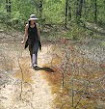 2010 Symposium on Sustainable Horticulture
2010 Symposium on Sustainable HorticultureLiving Plants, Liveable Communities
Royal Botanical Gardens
Burlington, ON
Canadian Institute for Sustainable Biodiversity
Looks interesting. Check out the timetable. I'm already appreciating that, upfront, the opening keynote address will be "Sustainability in the Built Landscape: Pathway to the Future or Greenwashing at its Worst??" by Dr. David A. Galbraith, Head of Science, Royal Botanical Gardens; because, well, isn't that anyone's first question when they're approached by organized horticulture initiatives?
Always good to see any case when the word "horticulture" isn't being used as a synonym for exotic or invasive landscaping too.
I've been seeing more confluences between conventional and native plant horticulture lately.
"Gardens are a transformation of the naturally occurring environment. While we work to create something of beauty, interest and or practical benefit, we should be aware that we are affecting natural processes. Gardeners select specific plant species and eliminate others, tailoring plots of land to taste. The simple process of selection changes the biodiversity of an area. For good or bad, gardening results in irreversible changes in the evolution of the planet." - Catherine Kavassalis, haltonhelps.org and President Oakville Horticultural Society (2008)Too much of conventional horticulture is still backed by an avalanche of concerned-for-profit-only marketing associations (aka: where "professional" status is basically purchased, not earned). Still I think gardeners set the pace for a significant chunk the market.
(Reminds me: I've been thinking that someone should start a movement encouraging folks to swear off the-infinite-bounty-of-the-grocery-store-parking-lot. ;) Between the just plain messed-up invasive exotics, non-local and sketchy-source native plants, bark mulch from BC, the illusion of endless bags of peat mossed soils w/ plastic fertilizer pellets, and the way an impulsive plant-freak can hide their addiction in their grocery bill... I think a lot of too-convenient, impulsive, completely unnecessary and just plain bad decisions happen there. I'd really like to know what percent of the horticultural plant market sales happen in those parking lots).
And while we've got a long way to go before what are too often two separate streams are truly "speaking with one voice", ideally there wouldn't be a difference, just a lot of ecologically literate, mindful gardeners and a responsible horticultural industry serving them.
Imagine, ecological literacy not being an "alternative" that needs advocacy. I try to: the goal of every progressive movement is to make itself obsolete right? 'Til then, I'm thinking the best we can do is keep planting, learning and teaching each other more about the natural world around us, having the courage and common sense to call out ecologically devastating practices for what they are (there shouldn't even have to be a symposium on "sustainable" horticulture: that's quite an indictment of what the remainder of mainstream horticulture currently is), and voting-with-our-feet, soils, purchases, hands, minds, questions, support, cameras, workshops and who we choose to trust.

3 comments:
I heard about this on Friday, and thought it sounded interesting. Must investigate deeper to see if I could afford some time off to go.
Hi There. I really enjoyed reading your blog. I'd be interested to hear what you think about bamboo and it's potential in North America as a sustainable resourse. I have a blog dedicated to bamboo. Hope to hear from you...
Helen,
I'm trying to figure this out myself. :) time and money. but looks worth the effort. right now i'm leaning toward day 1 and 2. but i'd like to go to the pre-conference Tallgrass Ontario session too (bit of an herbaceous seed freak). i'm loving that they're setting tallgrass prairie seed collecting and cleaning certification standards and teaching folks. We have Society of Ecological Restoration Ontario (SERO) for guidelines, but so far, for certification, we've only had Forest Gene Conservation Association for woodies).
hopefully we'll at least be able to take in a couple of sessions together? :)
Post a Comment